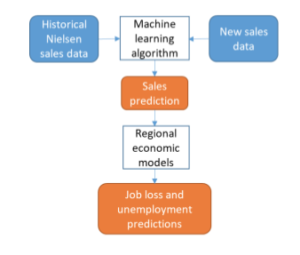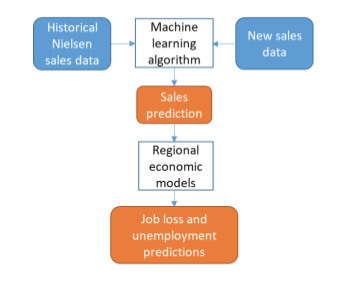As the physical and socioeconomic impacts of the COVID-19 pandemic continue to be explored by different experts, researchers at the University of Florida are using data from the past to establish a method for predicting the near-term economic impacts of the pandemic.
Christa Court, an assistant professor of regional economics in the Food and Resource Economics Department, said the project would use data from previous disaster events in Florida, such as tropical cyclones or the Great Recession, to establish a basis for future disaster events.
Researching real-time

“If we can prove that we can do this for past disasters, then it becomes a useful tool in the face of future natural disaster events such as tropical cyclones or economic shocks driven by unexpected events such as the COVID-19 pandemic.” Court said, adding that evaluating consumer purchase patterns have given the team understanding of how unemployment could be affected. “Then places such as food banks or food pantries could prepare for an expected increase in need for their services.”
In collaboration with Mostafa Reisi-Gahrooei, assistant professor in Industrial and Systems Engineering at UF, Court is researching data on past changes in sales revenue for businesses, changes in employment, changes in income and more. Their work on this proof-of-concept model aims to provide preliminary information to secure external funding to analyze near real-time data during the COVID-19 pandemic.
“The intrinsic similarity of the products purchased at different counties can be exploited to create efficient and parsimonious spatiotemporal models that predict the future consumer purchases,” Reisi-Gahrooei said. “These predictions are updated through a short-term updating mechanism as more data becomes available.”
Future plans
“(We) have regional economic models that will allow us to take those changes in consumer purchases and translate them into broader economic impacts,” Court said. The time frame of the project allows for an introduction to more details. “Databases and models based solely on historical information and structure isn’t going to help us much during an unprecedented event.”
There is still an informed guessing game in which researchers will take part until there is more publicly available data.
“Ideally we leverage this work to go after larger projects and measure the broader economic impacts of COVID-19,” Court said.
This project is funded by the Informatics Institute as part of their COVID-19 Response Fund. RSVP for the seminar about the collaborative project on Friday, November 6: Real-time Data-driven Analysis of Economic Impacts.
This story was originally posted by the Informatics Institute.
Check out more stories about UF research on COVID-19.

